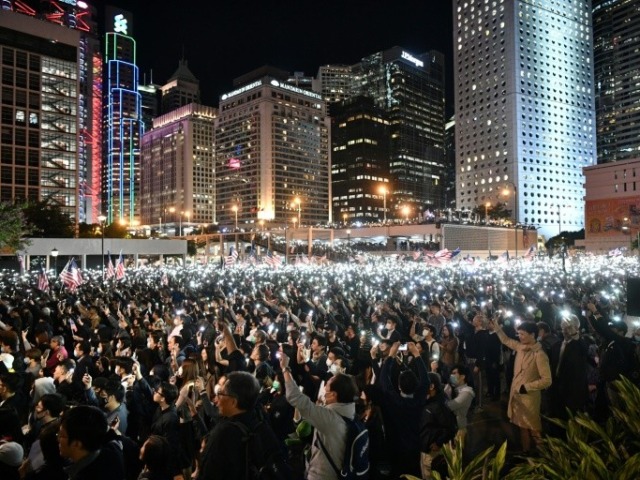A true Person of the Year award, not one dished out for political propaganda purposes, should acknowledge the tremendous influence of the Hong Kong protesters.
Their stunning defiance in the face of overwhelming odds, their firm adherence to principle at any cost, is changing the world.
The Hong Kong protesters have been cited by other movements around the world as an inspiration, from Indonesia to Iraq. Other movements have, on a more prosaic level, sought to copy the techniques developed by Hong Kongers to keep their demonstrations running in an era of high-tech surveillance and overwhelming government power.
Granted, some of those other movements have principles the Hong Kongers would disagree with, misinterpret what the people of Hong Kong are standing up for, and use their tactics in exceptionally destructive ways, but no matter which destination each movement seeks to reach or what rocky road it might choose to get there, the influence of Hong Kong is unmistakable.
For better and worse, one of the examples set by Hong Kong is the importance of leaderlessness when protesting against an authoritarian regime. Previous movements, including Hong Kong’s own Umbrella Movement in 2014, had leaders who could be targeted, intimidated, or incarcerated to leech the energy from protests and terrorize the rank and file.
Leaders were considered vital because their charisma and organization skills were vital to putting a movement together, their writings and speeches provided intellectual artillery, and they could become political candidates with agendas for meaningful change within the system.
Hong Kong’s protesters went a different route, organization with a variety of communications platforms to create a fast-moving political animal that could not be decapitated. Beijing and its flunkies in Hong Kong have labored mightily to discredit the movement as the work of hostile foreign operatives, but it is simply impossible to trivialize a huge and energetic movement with so many faces.
Of course, a leaderless movement has problems with controlling its message. Hong Kong has witnessed some unpleasant deeds carried out by peripheral characters, acts of vandalism that most of the marchers do not support. Remarkably, none of these activities seems to have discredited the protest movement in the eyes of the public.
Even more remarkably, the Hong Kong protesters have frustrated the Chinese Communist Party’s caricature of free people as lazy, self-indulgent, and easy to buy off. The protests continue despite tremendous inconvenience to the people of the incredibly crowded city and despite tremendous damage to the economy of the island.
Critics of the movement were certain it would wind down after tourist revenue dried up, jobs were lost, and treasured industries such as Cathay Pacific airline were threatened. The whole affair was started by public outrage over a bill for extraditing criminal suspects. Surely Hong Kongers would not stake their prosperity against the fate of a law that probably wouldn’t affect most of them!
But they did, because the people of Hong Kong are truly, deeply worried about losing the limited autonomy given to them by the deal that transferred the island from British control to China decades ago. They watched as their autonomy was chipped away by countless impositions and compromises, culminating in the rumble that preceded the avalanche of the extradition law protests: a portion of a railroad station in Hong Kong that was designated Chinese territory to make it easier for railroad passengers to travel between the island and the mainland.
The architects of the West Kowloon railroad terminal scheme were incredulous that anyone could object to shuffling a little paperwork to designate one small portion of the railroad station as Chinese soil so that passengers could more conveniently deal with customs concerns before boarding the high-speed train.
And yet, many Hong Kongers realized the importance of insisting on their autonomy and treating it as priceless. When the extradition bill came along, they were ready to deal with accusations of mindless intransigence over trivial points. They knew once they gave a bit of their autonomy away or bartered it for benefits, the rest would soon be taken. As soon as something has a price tag, it can be stolen.
The effect of Hong Kong’s protest movement has been strongly felt in Taiwan, which showed signs of slipping into Beijing’s orbit – after tremendous pressure applied for years by Communist China – but now seems reinvigorated in its determination to reject the “one country, two systems” model of limited autonomy.
During a televised presidential debate on Sunday, incumbent Taiwanese President Tsai Ing-wen read a letter from an unidentified young person in Hong Kong who urged the people of Taiwan to “not believe the Chinese communists, don’t believe any pro-communist official, and don’t fall into China’s money trap.”
Tsai presented the letter as evidence of the stakes in January’s election. Her opponent, Han Kuo-yu from the more pro-Beijing Kuomintang party, spent much of the debate insisting he didn’t believe in “one country, two systems” any longer.
Hong Kong is on the forefront of the great debates raging through every free nation, including the United States and United Kingdom: the argument about what sovereignty, citizenship, and independence really mean, and the global loss of faith in political establishments and their “experts.”
Those in the West who posture as “resistance” fighters while supporting the establishment should take a long look at Hong Kong and learn what resistance really means. Hong Kongers won’t even stop when told there is no conceivable endgame where they could “win.” They simply refuse to lose.

COMMENTS
Please let us know if you're having issues with commenting.